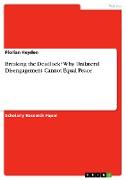- Start
- Breaking the Deadlock? Why Unilateral Disengagement Cannot Equal Peace
Breaking the Deadlock? Why Unilateral Disengagement Cannot Equal Peace
Angebote / Angebote:
Research Paper (undergraduate) from the year 2006 in the subject Politics - International Politics - Region: Near East, Near Orient, grade: Distinction (Very good), King`s College London (War College), course: The Occupied Territories since 1967, language: English, abstract: This paper looks at the potential of breaking the deadlock of the Israeli-Palestinian Conflict through a unilateral "gazaesque" withdrawal of Israel from the remaining Occupied Territories. Since the Oslo agreement, Palestinian leaders have found that a state cannot be created by a simple declaration - peace and statehood have so far stumbled over a number of issues and it is questionable if a unilateral disengagement will change these: we will underline the reasons why this is so and why it will not be able to bring peace and coexistence. While events so far have not changed the fact that a Palestinian State remains a non-entity, they have equally shown all but the most hawkish actors that, despite the determined pursuit of policies designed to make Israeli dominance permanent, it will not be able to maintain the occupation indefinitely against local resistance and a growing refusal and dissent of Israelis against occupation1. But what if Israel would opt for an all-out unilateral withdrawal behind its 'separation barrier'? Could such a move bring about an independent Palestinian State - 'instant-peace in the Middle East' - or could it inversely cause an explosive knock-off reaction on the region? Could it lead to the perpetration of past cycles of violence?
Folgt in ca. 10 Arbeitstagen
